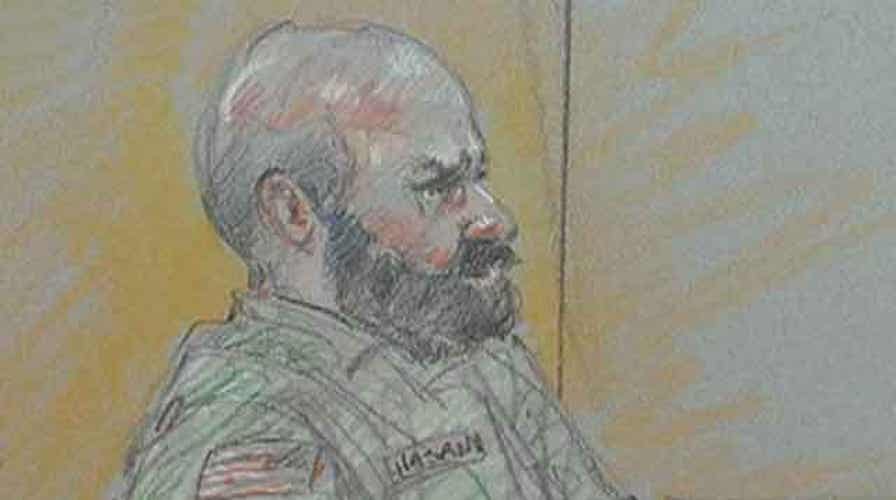Will Nidal Hasan ultimately be given the death sentence?
Suspect says 'I am the shooter' massacre at Fort Hood court-martial
The apparent death wish of Fort Hood shooter Nidal Hasan, which brought his court martial to a temporary halt Wednesday, came as no surprise to veteran prosecutors who have handled high-profile cases involving terrorists.
Hasan is representing himself but is advised by a team of attorneys appointed by the military court trying him for the Nov. 5, 2009 shooting at a Texas military base that left 13 dead and 30 injured. On Wednesday, members of his legal team told the military judge the former Army psychiatrist appears to be angling for the death penalty as he represents himself in the military trial.
One of the attorneys, Lt. Col. Kris Poppe, said he is willing to step in and serve as Hasan's attorney, a day after Hasan gave an opening argument that lasted less than two minutes and included an unambiguous admission that he "was the shooter" who killed 13 and injured 30 in the Nov. 5, 2009, attack at the Texas Army base. Hasan's court-appointed legal team is refusing to be part of a process in which Hasan seems determined to become a martyr, according to one former prosecutor experienced in terror cases.
[pullquote]
"This is his soapbox," said Andrew McCarthy, who, as a federal prosecutor, made the government's case against Sheik Omar Abdel Rahman in the 1993 bombing of the World Trade Center. "He’s really doing a performance to the world here, to the jihadists of the world here, and, secondly, he wants to get their case out there.”
McCarthy predicted Hasan will get the death penalty, regardless of how his legal team feels.
Former U.S. Air Force Col. Morris Davis, who was chief prosecutor of the Guantanamo military commissions from 2005-2007, said he saw the same stretegy employed by 9/11 mastermind Khalid Sheikh Mohammad, and noted that military law does not allow guilty pleas in cases where the defendant faces the death penalty.
"You have to figure that anyone so committed that he'll kill unarmed people believes he'll be rewarded for being a martyr for the cause," said Davis, now a law professor at Howard University School of Law. "That's one reason I'm not in favor of giving the death penalty to Khalid Sheikh Mohammed or Major Hasan ... why give them exactly what they want? A real punishment would be for them to live for many, many years locked away being totally irrelevant."
Hasan, who was left paralyzed in the attack, and is making his way around the courtroom in a wheelchair, didn't even bother to cross-examine several of the military's witnesses on Tuesday.
A day later, just minutes after testimony began, Judge Col. Tara Osborn cleared the courtroom and later said the trial would be in recess until Thursday so she can consider Poppe's motion.
Hasan, 42, an American-born Muslim, told the jury he was a soldier who switched sides in what he described as a war between America and his Islamic faith.
Among the witnesses who took the stand on Tuesday was shooting victim Staff Sgt. Alonzo Lunsford, who told jurors he panicked when he saw Hasan holding a weapon inside a building where soldiers were preparing to deploy in November 2009. Lunsford tried to appear dead after being shot, then later decided to flee because "dead men don't sweat,” he said.
Lunsford said soldiers were trying to push their way out of a double-door exit, but one door was locked shut, so it created a bottleneck.
Hasan, who wore green Army fatigues and a bushy beard, didn't cross-examine Lunsford. Earlier in the day, Hasan characterized himself as a "mujahedeen” and said the “dead bodies will show that war is an ugly thing.”
Hasan also cross-examined prosecution witnesses, including retired Lt. Col. Ben Kirk Phillips, his former boss. When pressed by the defendant, Phillips acknowledged that his officer evaluation report had graded Hasan as "outstanding."
Hasan is charged with 13 counts of premeditated murder and 32 counts of attempted premeditated murder. He faces the death penalty if convicted. No American soldier has been executed since 1961.
The trial is expected to take weeks and possibly months, as many of the more than 30 people wounded in the deadliest attack on a U.S. military installation could take the witness stand.
Fox News' Jennifer Girdon contributed to this report.


